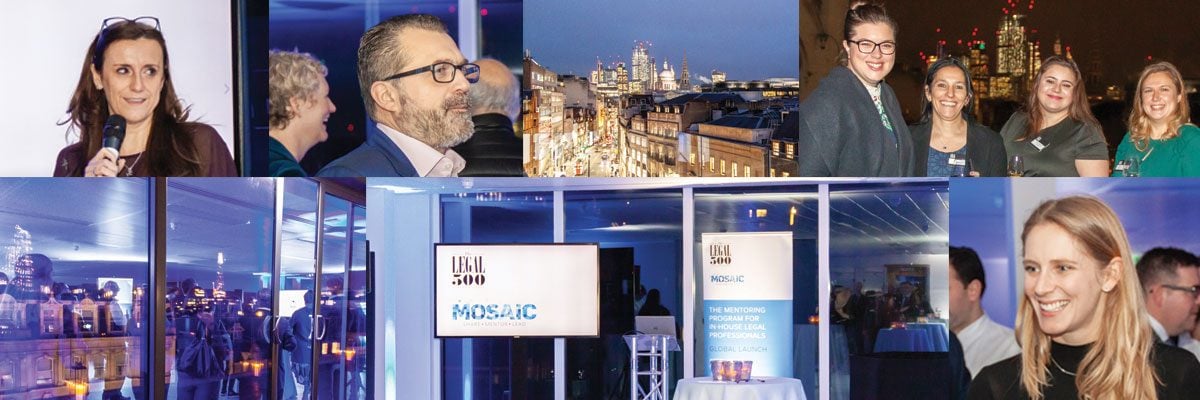The reputation of the legal profession is one of long hours and high pressure. This is true for both private practice and in-house lawyers, but the former is relatively well-catered to thanks to the defined corporate structures of private law firms and large support bases within such organisations. The latter, on the other hand, are often islands within their businesses with few other nearby lawyers to whom they can go for guidance and support.
Enter MOSAIC. An acronym for Mentoring Opportunities Shared Amongst In-House Counsel, the organisation was founded in 2015 in London and seeks to pair in-house counsel with suitable mentors from the profession. By 2017, MOSAIC had exceeded 100 mentoring pairs, and launched in the United States in December 2018.
‘Having been in-house lawyers ourselves for a number of years, we understood the benefits and the challenges that working in-house could bring,’ explain Claire Debney and Emma Sharpe, co-founders of MOSAIC. ‘MOSAIC was borne out of an expressed desire by in-house lawyers generally to have access to advice and gain other perspectives from those in-house.’
‘There are all sorts of opportunities for people in the legal profession and it’s really exciting to see all the different groups out there – be they legal tech, legal ops, disruptive innovation, women in the law and so on – but it feels like the in-house community has been left to co-ordinate itself and each group seems to operate in a silo. We need to do better at coming together as one community, recognising and building on the strengths that each group brings. We hope this is where MOSAIC can make a difference.’
The core of the programme is a bespoke technology platform, and is used by the mentors and mentees in all stages of the process. Mentors and mentees signing up for the programme are asked to complete a questionnaire. A bespoke algorithm suggests potential mentors, which the mentee can then make a mentoring request to any one of the suggested mentors. The platform also manages the practicalities of the mentoring relationship: scheduling meetings, setting goals and general communication.
‘Matching also very much depends on the mentee’s mentoring goals. Our standard connection plan is for 12 months and reflects the membership fee. Mentoring can be long-term, short-term, project-based, and mentoring can take place on a peer-to-peer basis. The frequency of meetings, location and structure of the mentoring should be agreed by the mentoring pair.’
Jamie Pearson, VP and head counsel for the Asia Pacific and Japan regions at Takeda, is currently registered as a mentor within the programme.
‘If it’s a good mentoring relationship, the support offered has the potential to make a material difference to people’s confidence and happiness at work,’ explains Pearson. ‘To break the idea of support down a little, I aspire to provide my mentees with a safe space in which to speak honestly about their work and their career, and hopefully useful advice that moves them in the direction that they want to go.’
‘I think a good mentoring relationship can be incredibly valuable from the mentee’s perspective,’ says Chris Sherwin, senior counsel at AstraZeneca and a registered mentee. ‘Most of us can get by fine without a mentor of course, but if you want to do more than just get by and you want to really excel, then having a mentor of some kind is essential. A good mentor helps us to identify the best in ourselves and to find ways to develop.’
The relationship between mentor and mentee has been envisioned as a two-way street: the mentees see the benefits of having the ear and advice of a more experienced lawyer, but the benefits extend to mentors and the wider profession, as well.
‘There can be a huge amount of value in talking something through with someone unconnected with your work, but who understands the job, the struggle, the desire to reach one’s full potential, the challenges, and ultimately the end goal, which is probably that we all want to be happy and satisfied with our work,’ says Pearson.
‘What I hadn’t expected is how doing the mentoring has become important to me. I really don’t do anything difficult in this role: I listen properly, I sympathise, I try to give advice that helps, thinking of situations that I’ve been in that were similar, and I ask questions.’
‘Essentially, all lawyers want to be thought of as useful. This role makes me feel useful in a work sense, outside the immediate sphere of my employer’s needs, and that feels really great. I would thoroughly recommend becoming a mentor.’
‘These programmes help shape a diverse profession and take some angst out of navigating the career path,’ adds Nilema Bhakta-Jones, another of MOSAIC’s registered mentors and CEO of Alacrity Law. ‘It helps us to pay it forward and show compassion, kindness and that the profession is full of people willing to help others. The Legal profession can be brutal and the competition fierce; sometimes the human being can be chewed up and lost in the process. I want to see more good people, and women in particular, from diverse backgrounds succeed. I learn a lot from my mentees and I experience joy in helping others.’
Mentors and mentees can become a member of MOSAIC by visiting www.mosaicforlawyers.com
